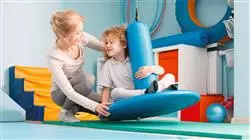University certificate
The world's largest faculty of psychology”
Introduction to the Program
A Postgraduate certificate in Motor Skills, Laterality and Writing is, at the present time, an invaluable tool for the neuropsychologist"

The work in neuropsychology is complex. It covers a broad spectrum of intervention that requires the professional to have very specific training in the various branches of brain development. This discipline, deeply linked to neurology and the physiological study of the brain, is affected by the changes that the evolution of knowledge in this scientific branch achieves. For professionals, this means an intense challenge of continuous updating that allows them to be at the forefront in terms of approach, intervention and monitoring of the cases that may arise in their practice
Throughout this program, the student will review all the current approaches to the work practiced by neuropsychologists with regard to the different challenges posed by their profession
The functioning of memory, language, the relationship between laterality and cognitive development, sensoriality and many other aspects, will be the topics of work and study that the student will be able to integrate in their training. A high-level step that will become a process of improvement, not only on a professional level, but also on a personal level
This challenge is one of TECH's social commitments: to help highly qualified professionals to specialize and to develop their personal, social and labor competencies during the course of their training
We will not only take you through the theoretical knowledge we offer, but we will introduce you to another way of studying and learning, one which is simpler, more organic and more efficient. We will work to keep you motivated and to create in you a passion for learning. And we will push you to think and develop critical thinking
A program created for professionals who aspire for excellence, and that will enable you to acquire new skills and strategies easily and effectively”
This Postgraduate certificate in Motor Skills, Laterality and Writing contains the most complete and up-to-date program available. The most important features include:
- The latest technology in online teaching software
- A highly visual teaching system, supported by graphic and schematic contents that are easy to assimilate and understand
- Practical cases presented by practicing experts
- State-of-the-art interactive video systems
- Teaching supported by telepractice
- Continuous updating and recycling systems
- Autonomous learning: full compatibility with other occupations
- Practical exercises for self-evaluation and learning verification
- Support groups and educational synergies: questions to the expert, debate and knowledge forums
- Communication with the teacher and individual reflection work
- Availability of content from any device, fixed or portable, with an Internet connection
- Complementary documentation banks permanently available, even after the Postgraduate Certificate
Working psychomotor skills as a means of brain development in schools is one of the new challenges for neuropsychologists”
Our teaching staff is made up of working professionals. In this way we ensure that we provide you with the up-to-date training we are aiming for. A multidisciplinary team of physicians with training and experience in different environments, who will develop theoretical knowledge effectively, but, above all, will bring their practical knowledge derived from their own experience to the program: one of the differential qualities of this Postgraduate certificate
This mastery of the subject is complemented by the effectiveness of the methodological design of this Postgraduate certificate. Developed by a multidisciplinary team of e-learning experts, it integrates the latest advances in educational technology. In this way, you will be able to study with a range of comfortable and versatile multimedia tools that will give you the operability you need in your training
The design of this program is based on Problem-Based Learning: an approach that conceives learning as a highly practical process. To achieve this remotely, we will use telepractice learning: with the help of an innovative interactive video system, and learning from an expert, you will be able to acquire the knowledge as if you were actually dealing with the scenario you are learning about. A concept that will allow you to integrate and fix learning in a more realistic and permanent way
It incorporates the latest intervention programs in the area of literacy development through laterality"

The basic processes of cognitive development in relation to learning and school development, in an intensive and comprehensive training"
Why study at TECH?
TECH is the world’s largest online university. With an impressive catalog of more than 14,000 university programs available in 11 languages, it is positioned as a leader in employability, with a 99% job placement rate. In addition, it relies on an enormous faculty of more than 6,000 professors of the highest international renown.

Study at the world's largest online university and guarantee your professional success. The future starts at TECH”
The world’s best online university according to FORBES
The prestigious Forbes magazine, specialized in business and finance, has highlighted TECH as “the world's best online university” This is what they have recently stated in an article in their digital edition in which they echo the success story of this institution, “thanks to the academic offer it provides, the selection of its teaching staff, and an innovative learning method aimed at educating the professionals of the future”
A revolutionary study method, a cutting-edge faculty and a practical focus: the key to TECH's success.
The most complete study plans on the university scene
TECH offers the most complete study plans on the university scene, with syllabuses that cover fundamental concepts and, at the same time, the main scientific advances in their specific scientific areas. In addition, these programs are continuously being updated to guarantee students the academic vanguard and the most in-demand professional skills. In this way, the university's qualifications provide its graduates with a significant advantage to propel their careers to success.
TECH offers the most comprehensive and intensive study plans on the current university scene.
A world-class teaching staff
TECH's teaching staff is made up of more than 6,000 professors with the highest international recognition. Professors, researchers and top executives of multinational companies, including Isaiah Covington, performance coach of the Boston Celtics; Magda Romanska, principal investigator at Harvard MetaLAB; Ignacio Wistumba, chairman of the department of translational molecular pathology at MD Anderson Cancer Center; and D.W. Pine, creative director of TIME magazine, among others.
Internationally renowned experts, specialized in different branches of Health, Technology, Communication and Business, form part of the TECH faculty.
A unique learning method
TECH is the first university to use Relearning in all its programs. It is the best online learning methodology, accredited with international teaching quality certifications, provided by prestigious educational agencies. In addition, this disruptive educational model is complemented with the “Case Method”, thereby setting up a unique online teaching strategy. Innovative teaching resources are also implemented, including detailed videos, infographics and interactive summaries.
TECH combines Relearning and the Case Method in all its university programs to guarantee excellent theoretical and practical learning, studying whenever and wherever you want.
The world's largest online university
TECH is the world’s largest online university. We are the largest educational institution, with the best and widest online educational catalog, one hundred percent online and covering the vast majority of areas of knowledge. We offer a large selection of our own degrees and accredited online undergraduate and postgraduate degrees. In total, more than 14,000 university degrees, in eleven different languages, make us the largest educational largest in the world.
TECH has the world's most extensive catalog of academic and official programs, available in more than 11 languages.
Google Premier Partner
The American technology giant has awarded TECH the Google Google Premier Partner badge. This award, which is only available to 3% of the world's companies, highlights the efficient, flexible and tailored experience that this university provides to students. The recognition as a Google Premier Partner not only accredits the maximum rigor, performance and investment in TECH's digital infrastructures, but also places this university as one of the world's leading technology companies.
Google has positioned TECH in the top 3% of the world's most important technology companies by awarding it its Google Premier Partner badge.
The official online university of the NBA
TECH is the official online university of the NBA. Thanks to our agreement with the biggest league in basketball, we offer our students exclusive university programs, as well as a wide variety of educational resources focused on the business of the league and other areas of the sports industry. Each program is made up of a uniquely designed syllabus and features exceptional guest hosts: professionals with a distinguished sports background who will offer their expertise on the most relevant topics.
TECH has been selected by the NBA, the world's top basketball league, as its official online university.
The top-rated university by its students
Students have positioned TECH as the world's top-rated university on the main review websites, with a highest rating of 4.9 out of 5, obtained from more than 1,000 reviews. These results consolidate TECH as the benchmark university institution at an international level, reflecting the excellence and positive impact of its educational model.” reflecting the excellence and positive impact of its educational model.”
TECH is the world’s top-rated university by its students.
Leaders in employability
TECH has managed to become the leading university in employability. 99% of its students obtain jobs in the academic field they have studied, within one year of completing any of the university's programs. A similar number achieve immediate career enhancement. All this thanks to a study methodology that bases its effectiveness on the acquisition of practical skills, which are absolutely necessary for professional development.
99% of TECH graduates find a job within a year of completing their studies.
Postgraduate Certificate in Motricity, Laterality and Writing
Would you like to be part of the cognitive development of children? Then TECH Global University's Postgraduate Certificate in Motor, Laterality and Handwriting is perfect for you. This program is designed to help you understand how children's brains work and how you can help them develop key learning skills such as motor skills, laterality and handwriting. In this Postgraduate Certificate, you will learn how motor skills and laterality are related to learning, and how good motor coordination can significantly improve children's academic performance. You will also discover the importance of laterality in writing development and how you can help children improve their writing skills.
Develop key skills for children's learning with this TECH Postgraduate Certificate.
The program also delves into how to identify potential learning difficulties and how to address them effectively. With the knowledge acquired in this Postgraduate Certificate, you will be able to contribute to the integral development of children and support them in their learning process. At TECH Global University we are committed to offer you quality learning, with the best professionals in the field of education. The Postgraduate Certificate in Motor Skills, Laterality and Writing is an opportunity to improve your skills in this field, and become a more complete and competent professional. Enroll now in the Postgraduate Certificate in Motor Skills, Laterality and Writing and start transforming lives through children's learning!







